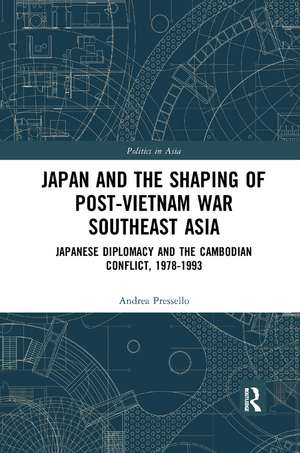Japan and the shaping of post-Vietnam War Southeast Asia: Japanese diplomacy and the Cambodian conflict, 1978-1993: Politics in Asia
Autor Andrea Presselloen Limba Engleză Paperback – 21 mar 2019
| Toate formatele și edițiile | Preț | Express |
|---|---|---|
| Paperback (1) | 393.46 lei 6-8 săpt. | |
| Taylor & Francis – 21 mar 2019 | 393.46 lei 6-8 săpt. | |
| Hardback (1) | 1000.27 lei 6-8 săpt. | |
| Taylor & Francis – 7 sep 2017 | 1000.27 lei 6-8 săpt. |
Din seria Politics in Asia
-
 Preț: 311.41 lei
Preț: 311.41 lei -
 Preț: 295.42 lei
Preț: 295.42 lei -
 Preț: 191.76 lei
Preț: 191.76 lei -
 Preț: 309.79 lei
Preț: 309.79 lei -
 Preț: 281.18 lei
Preț: 281.18 lei -
 Preț: 280.08 lei
Preț: 280.08 lei -
 Preț: 286.40 lei
Preț: 286.40 lei -
 Preț: 311.37 lei
Preț: 311.37 lei -
 Preț: 312.09 lei
Preț: 312.09 lei -
 Preț: 384.63 lei
Preț: 384.63 lei - 9%
 Preț: 933.65 lei
Preț: 933.65 lei - 18%
 Preț: 1168.37 lei
Preț: 1168.37 lei - 18%
 Preț: 1059.93 lei
Preț: 1059.93 lei -
 Preț: 423.30 lei
Preț: 423.30 lei - 18%
 Preț: 1065.06 lei
Preț: 1065.06 lei - 15%
 Preț: 706.72 lei
Preț: 706.72 lei -
 Preț: 445.89 lei
Preț: 445.89 lei - 18%
 Preț: 1011.30 lei
Preț: 1011.30 lei - 18%
 Preț: 1062.62 lei
Preț: 1062.62 lei - 18%
 Preț: 1383.80 lei
Preț: 1383.80 lei -
 Preț: 412.27 lei
Preț: 412.27 lei - 18%
 Preț: 1064.19 lei
Preț: 1064.19 lei - 18%
 Preț: 1004.20 lei
Preț: 1004.20 lei - 18%
 Preț: 1056.28 lei
Preț: 1056.28 lei - 18%
 Preț: 1058.79 lei
Preț: 1058.79 lei - 18%
 Preț: 1055.51 lei
Preț: 1055.51 lei -
 Preț: 412.70 lei
Preț: 412.70 lei -
 Preț: 405.80 lei
Preț: 405.80 lei -
 Preț: 416.96 lei
Preț: 416.96 lei - 18%
 Preț: 1002.68 lei
Preț: 1002.68 lei -
 Preț: 375.97 lei
Preț: 375.97 lei - 18%
 Preț: 700.93 lei
Preț: 700.93 lei -
 Preț: 448.44 lei
Preț: 448.44 lei - 18%
 Preț: 1059.84 lei
Preț: 1059.84 lei - 18%
 Preț: 1058.43 lei
Preț: 1058.43 lei - 25%
 Preț: 823.08 lei
Preț: 823.08 lei - 18%
 Preț: 1002.18 lei
Preț: 1002.18 lei -
 Preț: 394.36 lei
Preț: 394.36 lei - 22%
 Preț: 337.39 lei
Preț: 337.39 lei - 18%
 Preț: 1060.87 lei
Preț: 1060.87 lei - 18%
 Preț: 1055.51 lei
Preț: 1055.51 lei - 18%
 Preț: 1165.73 lei
Preț: 1165.73 lei - 18%
 Preț: 711.10 lei
Preț: 711.10 lei - 18%
 Preț: 1165.73 lei
Preț: 1165.73 lei - 18%
 Preț: 1059.45 lei
Preț: 1059.45 lei - 18%
 Preț: 1056.32 lei
Preț: 1056.32 lei
Preț: 393.46 lei
Nou
Puncte Express: 590
Preț estimativ în valută:
75.30€ • 78.02$ • 62.84£
75.30€ • 78.02$ • 62.84£
Carte tipărită la comandă
Livrare economică 21 martie-04 aprilie
Preluare comenzi: 021 569.72.76
Specificații
ISBN-13: 9780367272890
ISBN-10: 036727289X
Pagini: 264
Ilustrații: 2
Dimensiuni: 156 x 234 x 14 mm
Greutate: 0.39 kg
Ediția:1
Editura: Taylor & Francis
Colecția Routledge
Seria Politics in Asia
Locul publicării:Oxford, United Kingdom
ISBN-10: 036727289X
Pagini: 264
Ilustrații: 2
Dimensiuni: 156 x 234 x 14 mm
Greutate: 0.39 kg
Ediția:1
Editura: Taylor & Francis
Colecția Routledge
Seria Politics in Asia
Locul publicării:Oxford, United Kingdom
Public țintă
Postgraduate and UndergraduateCuprins
Acknowledgments
Introduction
Introduction
- Southeast Asia in Japan’s postwar foreign policy, 1950s-1960s
- US’ "exit" and Japan’s entry: post-Vietnam War Southeast Asia and the Fukuda Doctrine, 1969-1977
- The Cambodian conflict and the polarization of Southeast Asia: Japan’s response, 1978-1980
- New Cold War and Japan’s pursuit of its regional agenda, 1981-1982
- The unfolding of Japan’s "twin-track" diplomacy in Southeast Asia, 1983-1984
- Changing Cold War environment and the intensification of Japan’s peace diplomacy, 1985-1988
- The Cambodian peace process and the shaping of post-Cold War Southeast Asia: Japan’s role, 1989-1993
Notă biografică
Andrea Pressello is Assistant Professor at National Graduate Institute for Policy Studies (GRIPS), Tokyo, Japan.
Descriere
This book addresses: what was Japan’s response to the challenges to its objectives and interests in Southeast Asia and to the Fukuda Doctrine? What role did Japan play for the settlement of the conflict in Cambodia? How did Japan’s diplomacy on the Cambodian problem affect the Japanese role in the region?
